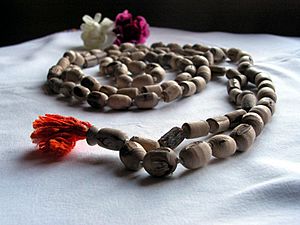Japamala facts for kids
Quick facts for kids Japamala |
|
|---|---|

Japa mala, made from tulasi wood, with head bead in foreground.
|
|
| Sanskrit name | |
| Sanskrit | mālā (माला) |
A Japamala or mala is a special string of beads. People use them for prayer and meditation in several religions. These include Hinduism, Jainism, Sikhism, and Buddhism. You might hear them called "prayer beads" or even a "rosary" sometimes.
Contents
What is a Japamala?
A mala helps people focus during a spiritual practice called japa. This means repeating a mantra (a sacred sound or phrase) or the name of a deity (a god or goddess). It's a way to keep count of how many times a person repeats their prayers or mantras.
How Many Beads Are There?
Most malas have 108 beads. This number is considered very important in many traditions. Besides the 108 main beads, there is often one extra bead. This 109th bead is usually bigger or a different color. It's called the "guru bead" or "sumeru." It helps you know when you have completed one full round of 108 repetitions. Sometimes, there are also tassels or other small beads for decoration or to help count multiple rounds.
What Are Malas Made Of?
Malas can be made from many different materials. Some common materials include wood, seeds, stones, or even pearls. The type of material can sometimes have a special meaning in different spiritual practices. For example, some malas are made from tulasi wood or rudraksha seeds.
Images for kids
-
Portrait of Sawai Madho Singh counting beads on a pearl and ruby mala; Jaipur, c. 1750
See also
 In Spanish: Yapa mala para niños
In Spanish: Yapa mala para niños
 | Roy Wilkins |
 | John Lewis |
 | Linda Carol Brown |







